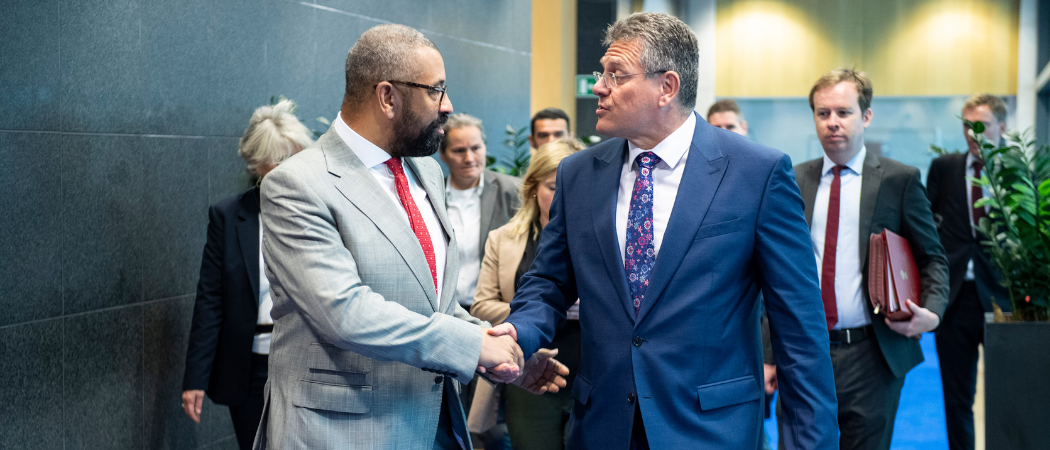Media reports of a draft deal between the two sides remain unconfirmed by EU officials, but various groups in the research community have welcomed positive signs

James Cleverly, UK secretary of state for Foreign, Commonwealth and Development Affairs (Left) with Commission vice-president Maroš Šefčovič in Brussels. Photo: European Union
Multiple sources in Brussels say talks are still continuing over the terms by which the UK could join the Horizon Europe R&D programme.
News of a draft deal on UK association was first reported today by Politico, citing UK government officials who were confident the agreement will be confirmed next week by UK prime minister Rishi Sunak and European Commission president Ursula von der Leyen. The pair are due to meet on Tuesday at an upcoming NATO summit in Vilnius, Lithuania.
However, sources in the European Commission have denied knowledge of a deal, saying that news reports rely on information only from the UK side.
Daniel Sheridan Ferrie, the European Commission’s spokesman for EU-UK agreements, refused to comment on media speculation but reiterated that the EU and UK remain “in discussions” over the UK’s participation in EU programmes, as foreseen by the EU–UK Trade and Cooperation Agreement (TCA).
But there is a feeling of positivity coming from both sides of the Channel about the potential of a deal manifesting, after months of speculation that one could be close.
At a meeting of the EU-UK Partnership Council in Brussels at the beginning of this week, Commission vice-president Maroš Šefčovič, who is also co-chair of the Partnership Council, called on association to be completed as soon as possible for the sake of scientists.
He said the EU’s approach to UK association has been flexible from a financial point of view, with Brussels not demanding the UK pay in for the first two years of the programme that it has missed out on.
“We are talking to our UK friends, I hope we will be able to resolve it because from our perspective, the sooner we do the better,” he said.
Various groups with vested interest in UK association to Horizon Europe have welcomed reports of progress on talks between the two sides, but stopped short of celebrating a victory.
Greg Clark, the chair of UK parliament’s science committee said the reports are a welcome sign of progress but he was looking forward to “examining any agreement that is reached.”
Tim Bradshaw, chief executive of university alliance the Russell Group, said that the “seriousness with which the UK and EU are taking negotiations is encouraging”, adding he hopes a deal can be confirmed as soon as possible.
Jamie Arrowsmith, director of Universities UK International, said that they are “reassured” that both sides are approaching discussions in an open and constructive manner. “Today’s reports suggest that progress continues to be made, and that a deal may be close,” he said.
Long road to association
The UK dropped out of Horizon Europe, Copernicus and Euratom when it formally left the EU in January 2020. Since then, negotiations have been ongoing over its re-association to the programmes.
In February this year the EU and UK agreed a deal to resolve the dispute over the Northern Ireland protocol, which at that point was the main reason Brussels was blocking the UK’s association to Horizon Europe. This led to hope on both sides of the Channel of a swift deal.
But talks between the two sides have since been bogged down in the nitty gritty of exactly how much the UK should pay towards Horizon Europe’s budget, with the UK government saying it should “reflect the lasting impact of two years of EU delays to the UK’s association.”
Last month, the UK government extended its scheme supporting Horizon Europe applicants by three more months until the end of September.
The UK has also been laying the groundwork for an alternative, domestic research programme dubbed Pioneer. First details were announced in April, but there was no word on when the government would decide to call time on Horizon Europe association talks and launch the £14.6 billion UK go-it-alone programme.





 A unique international forum for public research organisations and companies to connect their external engagement with strategic interests around their R&D system.
A unique international forum for public research organisations and companies to connect their external engagement with strategic interests around their R&D system.